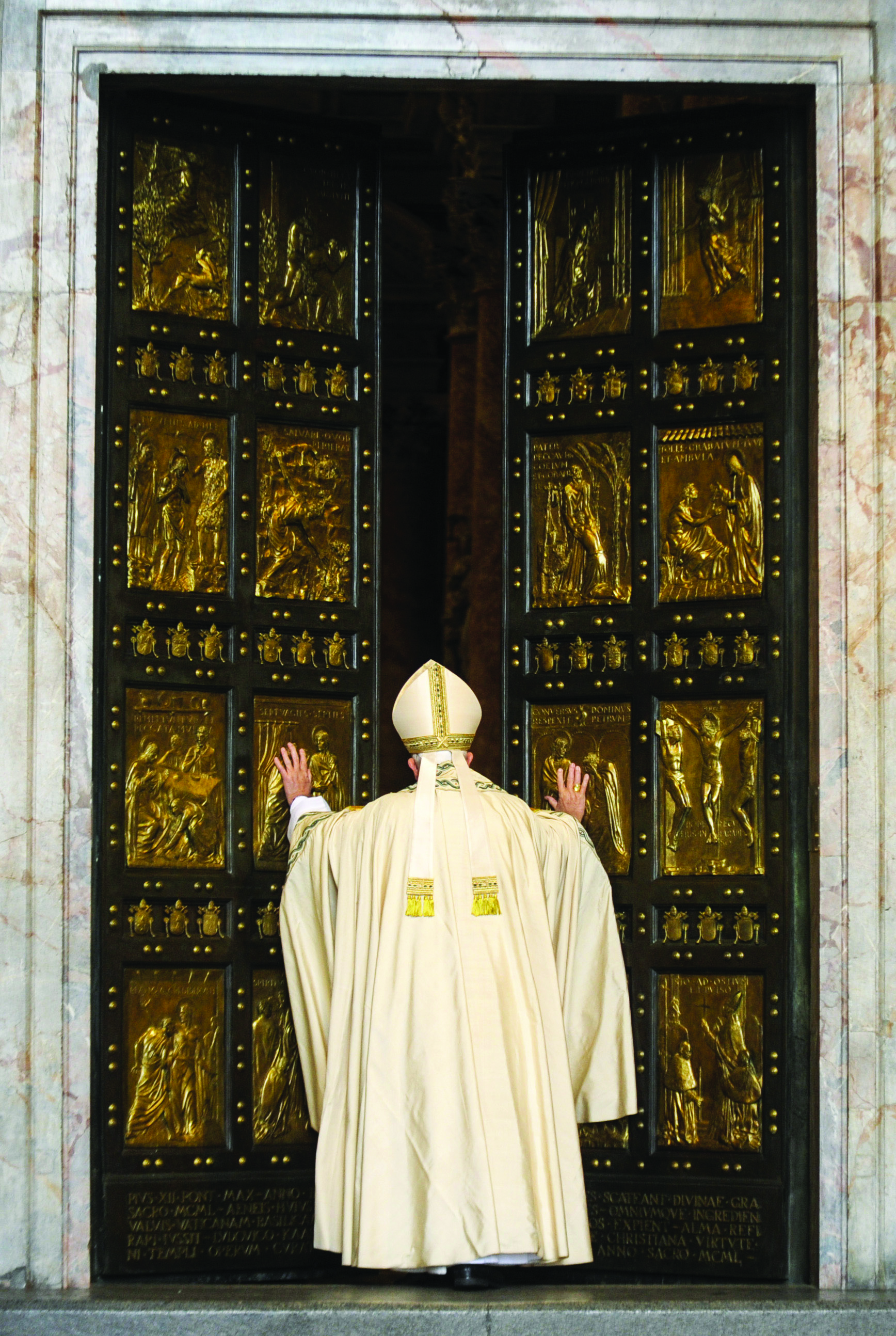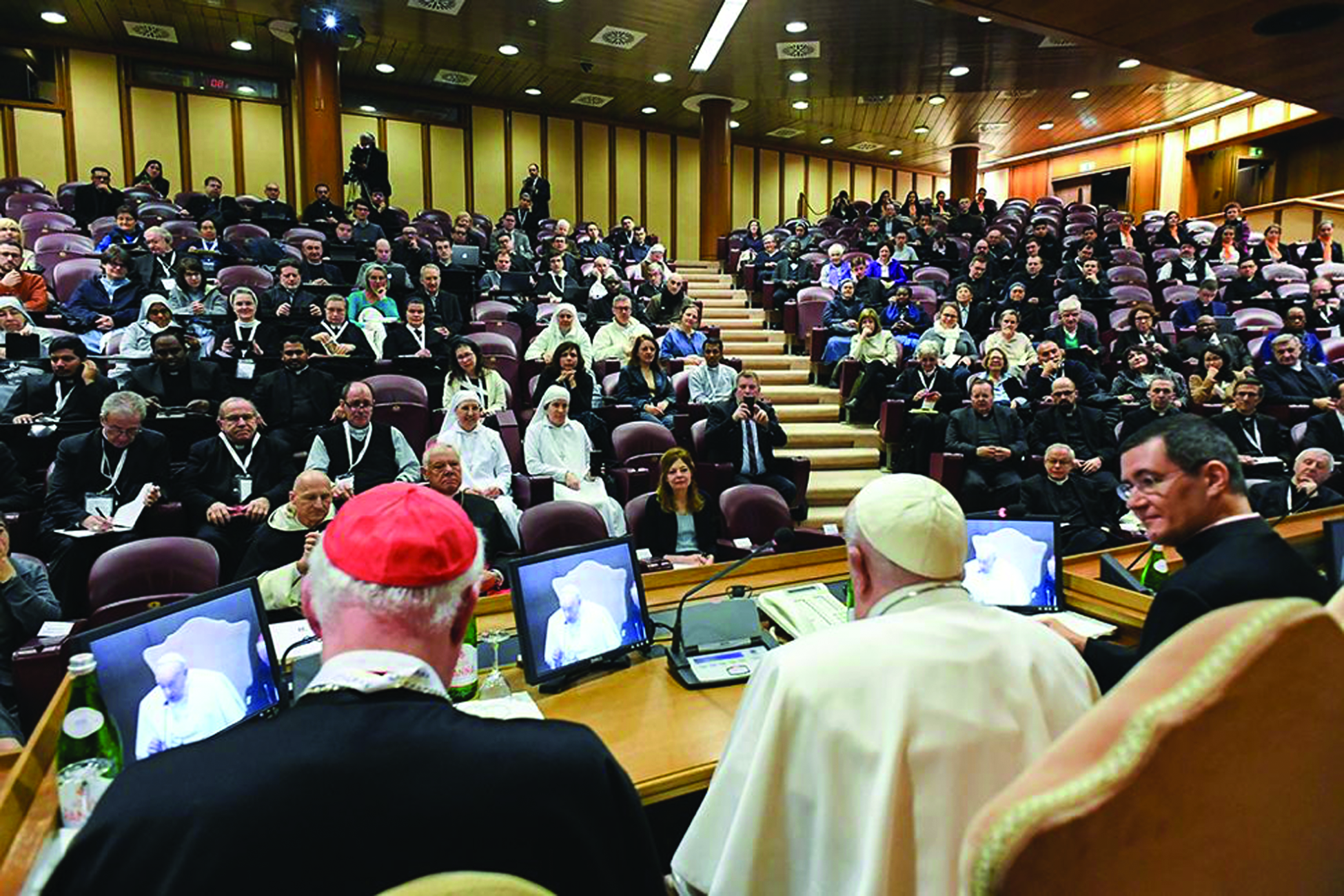Bishops are our shepherds—and custodians of the True Eucharist
By Marcellus Roberts*

The author of this reflection attended a Corpus Christi procession established by Bishop Joseph Strickland, formerly the bishop of the diocese of Tyler, Texas. The procession, which took place at a prison where the author is a prisoner, deeply impacted the prisoner. In the photo, Bishop Strickland, no longer the bishop of Tyler, speaks to supporters outside the United States Conference of Catholic Bishops at the Marriott Waterfront hotel in Baltimore, on November 15, 2023. (Wesley LaPointe/NYT. Photo from chron.com)
Measuring in at 18” high, composed of four small pieces of pine and a collapsible, transparent enclosure for the Blessed Sacrament, ours is a most modest monstrance, and we’re glad to have it. Had it not been for Bishop Joseph Strickland’s Diocesan Constitution, I may never have participated in my first Eucharistic procession.
Bishop Strickland’s Constitution prescribed a public procession for every parish church in celebration of the Feast of Corpus Christi. It would be a teaching moment, stressing the importance of holding processions in honor of our Eucharistic Lord, regardless of how humble the circumstances.
Reading the decree somehow changed our community, deep down, fundamentally. Perhaps at the nexus where the spirit of a man animates his mitochondria, the zeal of obedience went into manufacture; our Catholic DNA contending to express itself in substance and behavior, triggered by our bishop’s authoritative influence.
There are no less than 17 state prisons in the Diocese of Tyler, and I doubt any of them has experienced a moment more sacred than the Eucharistic procession held on George Beto unit at the request of Bishop Strickland. It was strikingly solemn and slow-motion-camerawork-worthy. You’d agree, had you seen the chairs empty as men left them behind to join the train, had you felt the Real Presence dissipate the gloom of incarceration, had you heard the choir raising the English translation of the Adoro te Devote on high, its ancient melodies providing just enough lilt for Father Gary Kottman to raise our lowly monstrance aloft and lead the throng toward the periphery of the prison’s chapel. For praiseworthy scenes like this to become common in criminal justice institutions, there has to be initiative and instigation by the presiding bishop.
The last place you’d expect to find willful submission to authority and the least likely location to look for it is in a Texas state prison, right?
Our outlaw image gallops ahead of us, astride a wild and mythical stigma that leaves little wiggle room for first impressions and no hope for reform.
But left behind, bewildered and coughing, wheezing in a thick cloud of caricature, are flesh-and-blood, bleary-eyed men and women in the throes of repentance, whose consciences crave God’s lawful authority, whose slack arms and feeble knees tremble in supplication for the strength to obey God’s lawful authority.
“For even as Jesus Christ, our inseparable Life, is Mind of the Father, as also the bishops, established in the furthest quarters, are in the mind of Jesus Christ. Hence it is fitting for you to set yourselves in harmony with the mind of the bishop, as indeed you do.” (St. Ignatius of Antioch, The Epistle to the Ephesians)
Prison spirituality, if it is ever found anywhere to be flourishing and vibrant, must be Ignatian — not in the Jesuit sense, but cut from Antiochene cloth; the Ignatius that stands up and offers his services free of charge when asked the question “Is there a doctor in the house?”
St. Ignatius has been dubbed the “Doctor of Unity.” His perennial prescription is that Church unity be concentrated in the descendants of the Apostles, the bishops, who are the custodians of the True Eucharist. Since this is the case, and inmates are not free to draw near to the eucharist on our own, we are totally dependent on the bishop to bring the Blessed Sacrament to us. We hope for a tangible rapport between Christ’s bishop and Christ’s prisoner in bonds — a rapport that begins by making sure inmates have access to the sacraments, and culminates in a face-to-face encounter between Christ’s bishop and Christ the Convict somewhere within the borders of the diocese: “I was in prison and you visited me.”
Ahem. Okay, I’m sure you’ve been wondering when I would address the creature in the corner with the face covered in velvet-like fur. Don’t be intimidated in the least by the canines on that beast when he gapes his jaws in a self-satisfied yawn. Neither cower when he balls up his powerful black palms and beats his chest in a sign of aggression. This, my brothers and sisters, is the fivehundred-pound gorilla in the room: the fact that my bishop was removed, late last year, from his position as Bishop of the Diocese of Tyler, Texas, by our Holy Father, Pope Francis.
The news hit us like a linebacker, blindside. Texas inmates have only recently gained access to the AP news app, and when word hit the wire, the men of our community were fielding questions from the curious, the concerned, and the crazies alike.
“…knowing that the same experience of suffering is required of your brotherhood throughout the world…” (1 Peter 5:9)
As brothers we discussed it before evening prayer. As a community we talked it at R.C.I.A. Deacon Rose spoke on the issue at our Communion service. It hurt.
For the first few weeks after the event, there was a noticeable wincing whenever the evening office required us to pray for our Pope and our bishop. Over the eight years we’ve prayed the Office on my cell block, sentimentality had cemented the image of two men, mighty clerics, lock-step and in league with each other.
To this day, we still stutter at the intercession “Francis our Pope and Joseph… no… Who’s our bishop?” The twinge of a newly orphaned child burrows its way between my ribs without my permission every time, especially when recalling statements like this:
“And certainly, we can’t ignore that people are hungry, that babies are being murdered in the womb, that the borders are a mess, all of those things; but I firmly believe that a pastor’s first job is to focus on converting the hearts of the flock and sending them out to do the things that the Gospel talks about.” (Bishop Joseph E. Strickland, Light and Leaven).
If I may, for the sake of closure, present my final progress report on the spiritual health of the Catholic community on George Beto unit under the authoritative influence of the Most Reverend Bishop Joseph E. Strickland:
We teach the Catholic Faith using the supplementary material supplied by the St. Phillip’s Institute of the Diocese of Tyler. Ten copies of Light and Leaven are made available to help us address the challenges of the laity in the twenty-first century. We have organized a bilingual small support group study of Bishop Robert Barron’s This is My Body to promote a revival of Eucharistic belief and devotion in our congregation. The principal parts of the Mass are chanted in Greek and Latin during the solemn seasons of Advent, Christmas, Lent and Eastertide. And as for evangelization, I, personally, have helped bring about one Confirmation per year, on average, since joining the Catholic Church in 2015.
All of this has been done in a prison, at the instigation of Bishop Strickland’s Diocesan Constitution, to realize his goal of making the Diocese of Tyler a teaching diocese.
Catholic prisoners do penance beyond the strict limits of society, on the periphery. Still, the Holy Spirit gives us the ability to respond to our bishops with quickness and clarity; call it “…spooky action at a distance.”
So, from the perspective of those who live on the periphery, the next bishop chosen to shepherd our Diocese needs to possess certain qualities that can only be accurately expressed in the colloquial terms of a Texas inmate… He’ll need to be “stomp down” about prison ministry. Leaving one priest and a solitary deacon to serve 17 state prisons cannot be an option for him. Indeed, he’ll need to “have it on his mind” to become world-class when it comes to serving the incarcerated segment of his flock. He’ll need to “go hard” in the ways of God. There must be something wild, Western and unflinching about the way he executes the will of God. Out here we live or die by the verity of our convictions and the subtle movements of our conscience.
Most of all, he must be “about that life,” when it comes to the Eucharist. Every Catholic needs the Eucharist coursing through his veins, as well as the faith that Christ is truly present, and the know-how to respond to this great gift of Jesus in love.
But, regardless, we are ready to welcome and work along with the lawful authority of Christ’s Catholic Church, even if only to cultivate the grace of obedience, which we believe bears its own fruit in due season.
This is the authentic voice of the periphery speaking on behalf of itself. Do not see our hearts as lifted up above others, or our eyes as raised too high. Nay, we are but children of God who need nothing more than to be calmed and quieted at the breast of Holy Mother Church.
For many months our monstrance has remained vacant, like the empty chair of the cathedral in Tyler, Texas, waiting to fulfill the purpose for which it was created.
*Marcellus Allen Roberts is a 40 year old Prison Oblate of St. Benedict’s Abbey, Atchison, Kansas. He is serving a 25 year penance in the state of Texas. He entered the Catholic Church in 2015, completed his noviciate year in 2016, and now serves the Catholic community on George Beto Unit as cantor and catechist.






Facebook Comments